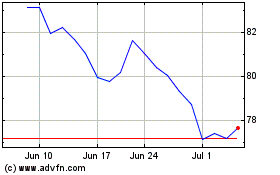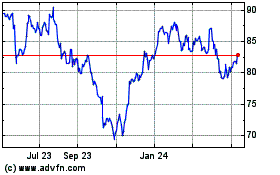
Enrollment
Underway in the U.S. for Groundbreaking Study Involving Three
Medtronic Devices: Arctic Front Advance(TM) Cryoballoon, Symplicity
Spyral(TM) & Reveal LINQ(TM) ICM
DUBLIN - April 30, 2015 -
Medtronic plc (NYSE: MDT) today announced the start of a clinical
study using Medtronic technologies to determine whether paroxysmal
and persistent atrial fibrillation (AF) can be treated with a
combination of two ablation procedures targeting different
anatomical locations - specifically, the pulmonary veins and the
renal arteries. Study patients will also receive an implantable
cardiac monitor to track their heart rhythm on an automatic and
continuous basis. AF is a cardiac rhythm disorder affecting an
estimated 2.7 million people in the U.S.
SYMPLICITY AF is a prospective, randomized,
multi-center, feasibility clinical study investigating pulmonary
vein isolation (PVI) and renal denervation compared to PVI alone,
for the treatment of paroxysmal or persistent AF in patients with
both AF and hypertension. PVI will be performed with the Arctic
Front Advance(TM) Cardiac Cryoablation system, and renal
denervation will be performed with the Symplicity Spyral(TM)
catheter and Symplicity G3(TM) radiofrequency (RF) generator. The
Symplicity Spyral catheter and G3 generator are investigational in
the United States.
Patients in both arms of the trial also will
receive a Reveal LINQ(TM) Insertable Cardiac Monitor (ICM) to
automatically and continuously detect and record the net recurrence
of abnormal heart rhythms after therapy randomization. This more
comprehensive method of cardiac monitoring will provide greater
detail and accuracy about the treatment effect of combination
therapy with PVI and renal denervation versus PVI alone. Emile G.
Daoud, M.D., at The Ohio State University Wexner Medical Center
enrolled the first patient in the trial.
"Hypertension is one of the most prevalent risk
factors for developing AF, but we've seen that it is also
potentially the most modifiable risk factor for halting the
progression of the disease," said principal investigator Larry
Chinitz, M.D., director, Heart Rhythm Center, NYU Langone Medical
Center in New York. "As we continue to look for ways to prevent AF
recurrence and improve outcomes for patients with AF, this trial
may reveal a potential new treatment path for patients."
Studies have shown that an overactive sympathetic
nervous system (SNS) contributes to the development of both
hypertension and AF. Current AF therapies do not specifically
address SNS over activity and historically have focused on
maintenance and regulation of rate and rhythm as well as
anti-coagulation to prevent stroke. Renal denervation has been
shown to effectively reduce elevated SNS activity[1], and
previous research has signaled that renal denervation combined with
PVI may improve patient response to PVI in AF patients.[2]
SYMPLICITY AF will enroll up to 245 patients in up
to 12 centers throughout the United States. Seventy of these
patients meeting all inclusion but no exclusion criteria and thus
determined to be eligible for the trial will then be randomized to
either PVI and RDN or PVI alone; all randomized subjects will
receive a Reveal LINQ ICM. The primary safety endpoint is comprised
of events related to both the PVI and RDN procedures. The primary
efficacy endpoint will measure freedom of chronic treatment
failure, defined as AF lasting 30 seconds or longer or the
requirement for an intervention for atrial fibrillation through a
minimum of six months. Heart rhythm data from the Reveal LINQ ICM
will be reviewed monthly.
Enrollees in the trial include patients with
either paroxysmal or persistent AF, and hypertension defined as
office-based systolic blood pressure of >=150 mm Hg, despite
treatment with two or more antihypertensive medications at the
highest appropriate dose. AF is considered paroxysmal, or
occasional, when the upper chambers of the heart beat erratically
during self-terminating episodes lasting from a few minutes to a
few days. AF is considered persistent when symptoms persist for
more than seven days and medical intervention is needed to
terminate the episode.
The study will also gather feasibility outcomes
data on the use of the Arctic Front Advance Cardiac Cryoablation
Catheter for PVI in the persistent AF population. The Arctic Front
Advance Cardiac Cryoablation system is not approved in the United
States for the treatment of persistent AF; therefore, it is
considered investigational in this patient population.
"The SYMPLICITY AF study, investigating three of
Medtronic's notable technologies, is a groundbreaking effort and an
excellent example of our commitment to driving clinical benefit
through innovation," said Michael J. Coyle, executive vice
president and president of Medtronic's Cardiac and Vascular Group.
"Only Medtronic has the breadth and depth of cardiac-related
technology to investigate new treatment and disease management
strategies in this unique manner for some of the most
difficult-to-treat conditions, such as AF."
About Medtronic Arctic Front
Advance CryoAblation Catheter System
Treatment with the Medtronic Arctic Front Advance Cryoballoon
System involves a minimally invasive procedure in which the
cryoballoon fills with coolant to ablate (freeze) the tissue where
the pulmonary veins enter the left atrium, blocking the abnormal
electrical signals that trigger erratic heart rhythms. Delivered
via a catheter, the cryoballoon technology has been associated with
faster procedure times than point-by-point radiofrequency
ablation.
In the United States, cryoablation is FDA-approved
for patients with drug refractory, recurrent, symptomatic,
paroxysmal AF; it is not approved for patients with persistent AF.
Cryoablation has been shown to deliver better outcomes in
paroxysmal AF patients for whom at least one drug therapy has
previously failed. Worldwide, the system has been used to treat
more than 120,000 patients in approximately 1,000 centers across 50
countries.
About Medtronic's Symplicity
Spyral Catheter and G3 Generator
Medtronic's renal denervation technology consists of the Symplicity
Spyral multi-electrode catheter and the Symplicity G3(TM) RF
Generator. Treatment involves a minimally invasive endovascular
procedure, where the physician inserts the small, flexible Spyral
catheter into the femoral artery in the upper thigh and threads it
into both renal arteries in turn. Once the catheter is in place
within the renal artery, the G3 generator is activated to deliver
controlled, low-power radio-frequency (RF) energy, according to a
proprietary algorithm aiming to deactivate the surrounding renal
nerves for the goal of reducing the increased activity of the
sympathetic nervous system. The Spyral catheter uniquely
offers physicians control and flexibility with the ability to turn
specific electrodes on and off to accommodate different anatomies.
The next generation system is based on Medtronic's single-electrode
Symplicity renal denervation system, which has an established
safety profile.
About Medtronic's Reveal LINQ
Insertable Cardiac Monitor (ICM)
Cleared by the Food and Drug Administration (FDA) in 2014, the
Reveal LINQ ICM System is the newest generation of ICM and the
smallest cardiac monitor available (~1 cc, or one-third the size of
a AAA battery). Common uses include monitoring syncope
patients for potential episodes of bradycardia/asystole, monitoring
cryptogenic stroke (strokes of unknown cause) patients for possible
episodes of AF, and monitoring patients suffering from intermittent
chest palpitations for potential episodes of atrial or ventricular
arrhythmias. The Reveal LINQ ICM is inserted under the skin
of the chest (incision less than 1-cm), and its battery allows for
up to three years of monitoring. Additionally, the device
communicates wirelessly with a patient bedside monitor that uploads
device data to the Medtronic CareLink® Network.
In collaboration with leading clinicians,
researchers and scientists worldwide, Medtronic offers the broadest
range of innovative medical technology for the interventional and
surgical treatment of cardiovascular disease and cardiac
arrhythmias.
About Medtronic
Medtronic plc (www.medtronic.com), headquartered in Dublin,
Ireland, is the global leader in medical technology - alleviating
pain, restoring health and extending life for millions of people
around the world.
Any forward-looking statements
are subject to risks and uncertainties such as those described in
Medtronic's periodic reports on file with the Securities and
Exchange Commission. Actual results may differ materially from
anticipated results.
-end-
[1] Kaltenbach
B, Franke J, Bertog SC, Steinberg DH, Hofmann I, Sievert H. Renal
sympathetic denervation as second line therapy in mild resistant
hypertension - a pilot study. Catheter Cardiovasc Interv. 2013
Feb;81(2):335-9.
[2] Pokushalov
E, Romanov A, Corbucci G, et al. A randomized comparison of
pulmonary vein isolation with versus without concomitant
renal artery denervation in patients with refractory symptomatic
atrial fibrillation and resistant hypertension. J Am Coll
Cardiol 2012; 60: 1163-1170.
Contacts:
Wendy Dougherty
Public Relations
+1-763-381-1204
Jeff Warren
Investor Relations
+1-763-505-2696
This
announcement is distributed by NASDAQ OMX Corporate Solutions on
behalf of NASDAQ OMX Corporate Solutions clients.
The issuer of this announcement warrants that they are solely
responsible for the content, accuracy and originality of the
information contained therein.
Source: Medtronic plc via Globenewswire
HUG#1917086
Medtronic (NYSE:MDT)
Historical Stock Chart
From Mar 2024 to Apr 2024

Medtronic (NYSE:MDT)
Historical Stock Chart
From Apr 2023 to Apr 2024
